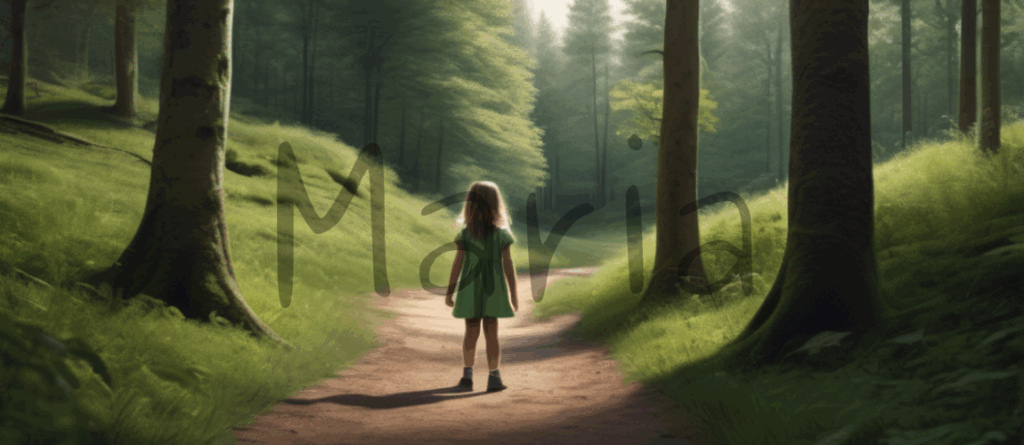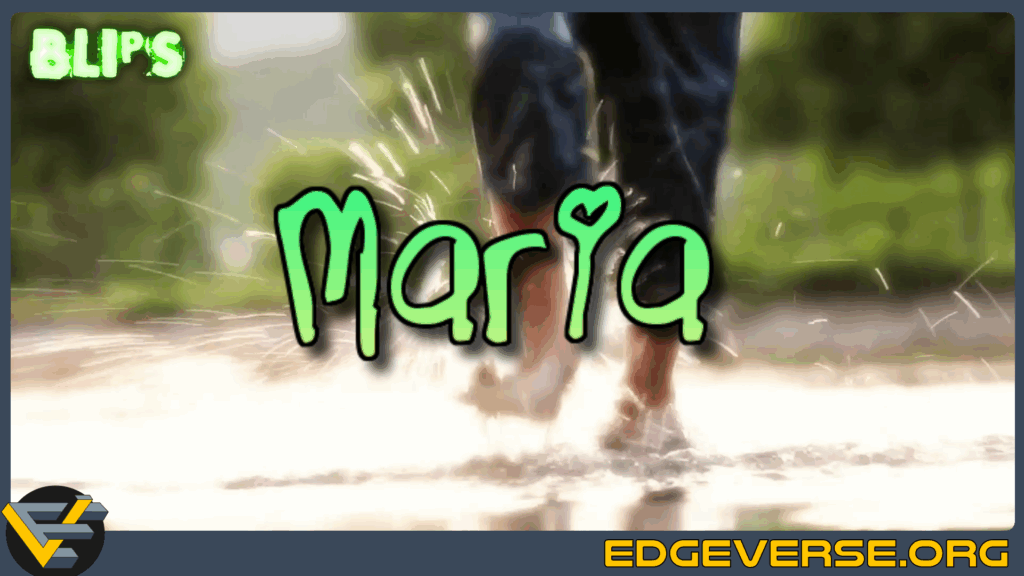
Maria
By A.P. Atkinson
Life is a series of events. People think that our existence passes by one second at a time, our lifespan ebbing away in a perfectly measured flow, like grains of sand passing through a cheap plastic egg-timer. But why do people think this, when it so obviously isn’t true?
Life is a staggered, juddering staccato, a lumbering, shuddering journey as we lurch from one thing to the next. We don’t age a moment at a time, one second bleeding into minutes, hours and days. We age less smoothly, stresses and strains smashing us down one terrible event at a time.
Sometimes, if misfortune singles you out for special treatment, a single event can destroy you forever, even if you are unlucky enough to survive it.
This is exactly what happened to me.
It happened three years ago, a day that changed everything forever and brought my world crashing down around me.
It was a beautiful day, a clear blue sky above us and lush green grass beneath our feet. The days of my weeks were spent in a grey building, air-conditioning growling away behind me while unnaturally cold air stung my lungs. I worked myself half to death, pouring out the best of myself for reasons that now escape me. I would tap numbers into a computer as instructed by my employer. In exchange, they would give me just enough money to provide a limited but acceptable life for my family. I never questioned it. When I was at school, we knew we were preparing for a life of labour, providing our span of years to the service of an uncaring system. I never considered the big picture, that there might be any other option. Are criminals really the sane ones?
At weekends, I would try to take my family out of my grim little world. This time, we went to a national park for the day. My wife made lunch and we packed some toys into the back of our small car. A short ride out of the city and we found ourselves at the edge of a field, surrounded by tall trees, cloaking the grassy floor with their welcoming cool shade. The air felt fresh and soft, unlike the harsh chemical taste of the office atmosphere.
My wife grumbled benignly about every little detail while I laughed in good nature at her, trying to shrug off her negativity. Our daughter, Maria, ran off screaming and chasing bubbles she blew from a little lime-green tube of soapy water.
My wife pointed at her and scowled. “Phil,” she said grumpily. “She’s going to fall and hurt herself!”
I shrugged and took a bite out of a sausage roll. “I couldn’t catch her if I tried,” I said with a chuckle. “Let her play; we don’t get a lot of days like this. Let her enjoy them.”
“Stay where I can see you!” she shouted at the top of her lungs, her voice echoing softly from the trees.
Maria shouted something back, but the words were lost to me. I just smiled.
“There are bears in the woods,” she said to me. “Wolves too, maybe.”
I smiled. “She’s not going into the woods,” I said. “If there are any bears around here, they’ll have the good sense to stay away from her before her screaming bursts their eardrums.”
My wife scowled. She hated parks; she hated being out of the city. She had wanted to go to a shopping mall and spend the day dragging me around clothes shops. She had been outvoted by Maria and I, and she was grumpy about it.
“Why don’t you go play with her while I set out the rest of the picnic,” she told me.
I snatched another sausage roll and bit into it, even though they were actually pretty terrible.
My wife was not the world’s best cook, which was putting it somewhat mildly. Part of the reason she objected to going to a park was that she’d have to prepare the food, I imagine. She could even ruin a sandwich, and that was the full extent of her culinary talent.
But we never noticed. We’d eat what she gave us, for the most part. Maria even liked her cooking. What did a 5 year old kid know about anything, I guess?
“Did you speak to Morgan?” she asked, hefting a box of cakes from the back of the car. “What’s meant to be happening with your promotion?”
My heart sank in my chest. I didn’t want to talk about work during the weekends. I wanted to escape from it, to get away and snatch a few moments of freedom from the endless apathetic grind of my weekly routine.
“I haven’t seen him,” I said, and I could hear the frustration in my own voice. “Let’s not talk about that today, let’s just enjoy the weather.”
She glared and sighed deeply. “We need the money, Phil.”
I huffed out a deep breath. “I know,” I said. “I know we do, but let’s just not do this today.”
“If I could work, I would,” she said. Clearly she wasn’t going to let this go. She never did. “When I was diagnosed bi-polar you said you could manage. You said you could earn enough to support the three of us.”
I knew what I’d said, because I was there when I said them. And when those words left my lips, I absolutely believed them to be true. I thought I could earn myself a promotion and get myself out of staff-training and into a managerial role. It didn’t matter that I loved working with the team, I would put all that aside to chase a pay rise, and I’d accept it because I was doing it for my family, the people I loved most in all the world.
It hadn’t been as easy as I had thought.
“Maybe you just don’t want a promotion?” she said with a snide lilt to her voice, a cutting tone she used far too often these days.
I couldn’t lie, she knew me too well for me to get away with it. “You’re right, I don’t,” I admitted. “But that doesn’t mean I’m not doing everything I can to get one.”
“The mortgage payments are going up in three months,” she reminded me, yet again.
“I know,” I said with a nod. I knew all too well. We were barely making ends meet now.
“Well then you need to do something,” she nagged, the same voice she used when she would scold Maria—something else she was doing far more often these days.
She handed me a knife, a long, slender blade I had sharpened only last weekend. “Cut the cake,” she told me, flashing me a look of bitter disappointment, a look she knew I hated more than any of the berating jibes. Every time I saw that look in her eyes, it killed a tiny little part of my soul.
I held the knife for a moment and a darkness came over me. I could end it all now, and for a fraction of a second I wondered why I didn’t. Why did I keep going to the same job, a job I increasingly hated? Why did I put up with her constantly moaning at me? Why did I stand by as my wife changed, until I barely recognised her as the woman I once married? Why was life so hard?
And then the answer to all of that flashed through my mind.
Maria.
She had changed everything in my life, and I would do anything for her, even if it meant dying one day at a time, slowly selling my life for a handful of lime-green tubes filled with bubbles, foul-tasting sausage rolls, and cakes that didn’t come pre-sliced.
“Maria,” I said. I looked around. “Where is my little girl?”
“Funny she’s suddenly your little girl when it isn’t bath-time, or her dinner doesn’t need cooking,” she grumbled. I could barely recognise her some days. When I met her, she had been so full of life, so energetic and so caring. Was this my fault? If it wasn’t, then why did she blame me? Why did I blame myself?
I looked around. There was no sign of her. “Carol, where’s Maria?”
“Playing,” she said, but even the tone of her voice was shifting.
My chest tightened and I felt a rising panic. “Where the hell is she?”
“Phil?” she cried out, her head snapping from one side to the other, desperately peering around. “Where is she?”
Now, the trees looked grim; now, their comfortable, inviting shade seemed like a threatening darkness, a vile blackness that swallowed up your very soul.
There was a sickening silence. The sound of a child playing, the happy squeals of a little girl running around with her toys wasn’t missing, it felt like it had been silenced, leaving a gaping chasm in reality.
I didn’t think about what to do next, but somehow I knew I was running. My chest was heaving. I had never been fit, and I was feeling it now as I ran with every ounce of power I could muster, the muscles in my legs burning already as I made my way into the trees.
I shouted out her name as I ran into the edge of the woods.
I searched for hours.
My wife called the police, and slowly, crowds began to arrive. Volunteers flooded in, and I remember wondering at the time where they had all come from. How did they know? Would I have volunteered if I had heard someone else’s child went missing? I honestly didn’t know. Did I deserve their help? Probably not, but Maria did.
They searched for hours, and those hours bled into days, and the days melted into weeks.
They never found anything.
Not even a shoe.
Nothing was ever the same after that, and it took me three years to work it all out, to figure out how you can carry on after something like this has happened. When you lose a child, you lose the best part of yourself and you will never be the same again. The guilt that this is all your fault eats away at you, destroying you from the inside out. You question everything, reliving the moment over and over again.
Did any of that day happen the way I remember it? I honestly don’t know anymore. Did I do enough to find her? Should I have made sure she stayed closer to us?
I laid awake at night, gazing into the darkness, wondering how Maria had felt. Was there a moment where she turned around and realised there was nothing there but trees, no path to take her back, and that she was trapped away from us? How did she feel when night fell, the shadows giving way to cold, hard blackness in which she knew that nobody was coming to find her.
And how did she die? Did she freeze to death on the first night, animals chewing away on her remains until her body was swallowed up? Did she fall into a river, drowning in the freezing depths as waves of panic filled her tiny little mind and brackish water flooded into her body? Did a predator find her? A bear? A wolf? Did it hunt her down while she ran, lost in terror for the last dwindling moments of her young life?
You live these moments on an endless loop, time after time as your mind plays them out, infinitely exploring every dark and twisted possibility. And there’s no escape. The horrors followed me into my dreams in the few snatched hours of fitful sleep I was occasionally able to grasp.
I look at myself in the mirror and I don’t know the man looking back at me. I had dark brown hair before, now it’s just grey. My eyes are framed by deeply-wrinkled, blackened skin from the endless sleepless nights. My youthful energy is gone. I’m little more than a husk now, a hollowed out shell of a man.
My wife fared even worse than I did. We stayed together at first, but neither of us knew why. We lost the house, and she was forced to go back to work, eventually getting a job in a supermarket. I hoped it would be a distraction for her, but it wasn’t, and she quickly spiralled down into her own mind.
She lives with her mother now. Her father died last year, a broken man. He loved Maria as much as we all did. I haven’t seen her in months, but I hear she’s barely coherent. I don’t know what medication she’s on, but it has scooped up every ounce of her humanity and ripped it out of her.
I hired a detective. I never got my promotion, but I rented a cheap bedsit and spent every dollar I earned on finding my daughter. There was still some tiny shred of hope that she had been found somehow and was still alive. I clung to that possibility with everything I had left.
I closed the door to my car, the same car that had taken us to the forest that fateful day. I’m going to see her now. After three years, I am finally going to see her again, that round, smiling face with her mother’s messy hair tumbling from her head, those chocolate-brown eyes that always sparkled with cheeky energy.
The engine purrs in the car and I make myself comfortable in the seat. This won’t take long.
I find myself smiling, the first time in as long as I can remember. This is finally happening.
The smell reminds me of the air conditioning at work, only the air is warm this time, not bitterly cold as it vents down my back. It’s strangely soothing, comforting in a way.
There is a rubber hose; I found one in the same lime-green colour, just because it seemed the right thing to do. The hose is sticking in through the passenger window and the gap around it is stuffed with old shirts. The other end is fixed to the exhaust and the gases are slowly filling my lungs.
It won’t take much longer now and I’ll be able to see her again.
I wonder if she’ll blame me for what happened, the way I blame myself. I wonder if she’ll forgive me.
Don’t worry, Maria.
Daddy’s coming.

Maria is a deeply emotional tale that was based on a tragically true story. Seth often took his daughter to play in a national park. He read an article about a child who vanished there and was never seen again. The parents were never able to come to terms with the loss and accept the grim reality of the situation.
Seth and I spoke about the story at length and eventually, as parents ourselves, this story was the inevitable outcome. It’s a sad and grim story where we explore the emotional impact of what we might expect to go through if such a terrible thing were to happen to us.
Many thanks for giving us this chance. We hope you enjoyed the free story and are encouraged to read more. If you choose to buy a book from us you’re supporting new independent authors and helping us to build this site and create more new content.
If you liked what you saw then please also consider reading our free books, other short stories and articles. Help support us to help support the future of independent fiction.
Check out more of our short stories and our online video narratives.


Damn…